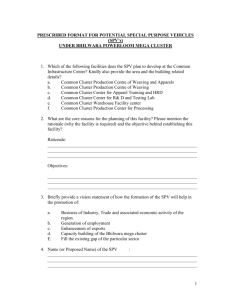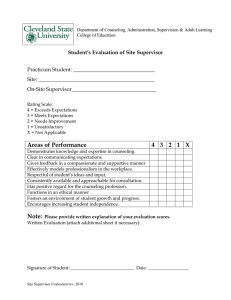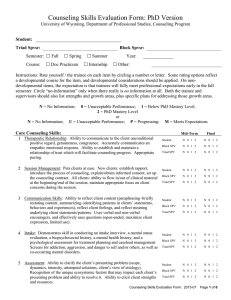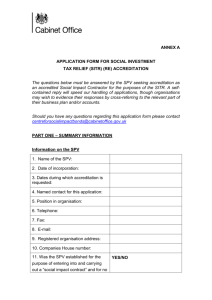Counseling Skills Evaluation Form - University of Wyoming
advertisement
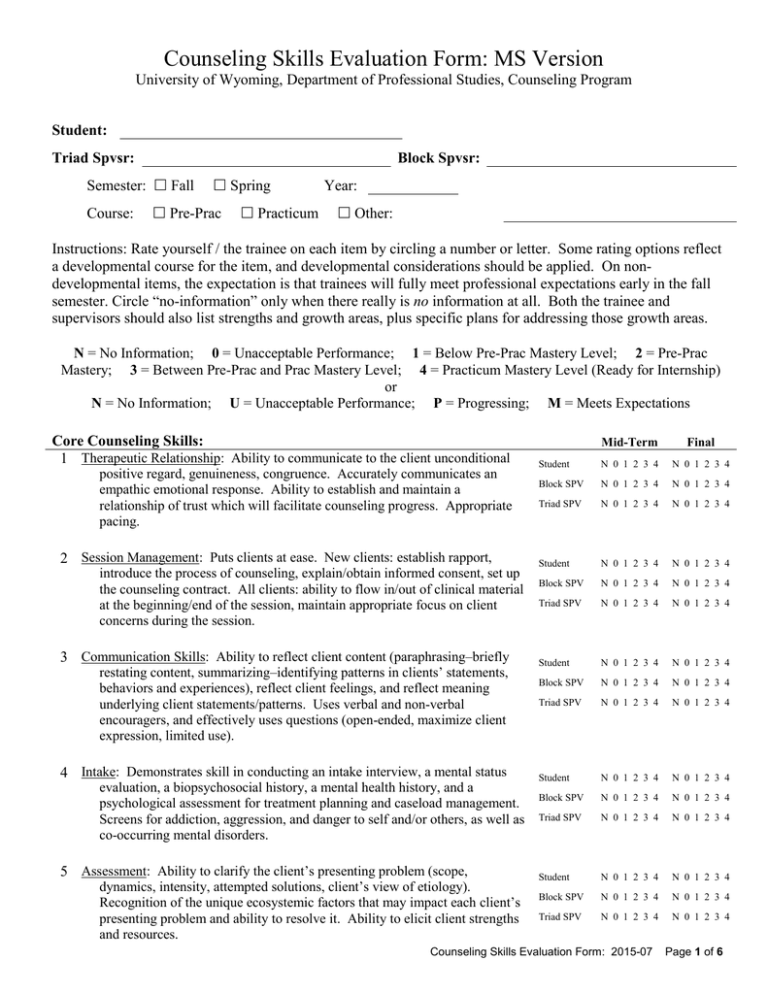
Counseling Skills Evaluation Form: MS Version University of Wyoming, Department of Professional Studies, Counseling Program Student: Triad Spvsr: Block Spvsr: Semester: Fall Course: Spring Pre-Prac Practicum Year: Other: Instructions: Rate yourself / the trainee on each item by circling a number or letter. Some rating options reflect a developmental course for the item, and developmental considerations should be applied. On nondevelopmental items, the expectation is that trainees will fully meet professional expectations early in the fall semester. Circle “no-information” only when there really is no information at all. Both the trainee and supervisors should also list strengths and growth areas, plus specific plans for addressing those growth areas. N = No Information; 0 = Unacceptable Performance; 1 = Below Pre-Prac Mastery Level; 2 = Pre-Prac Mastery; 3 = Between Pre-Prac and Prac Mastery Level; 4 = Practicum Mastery Level (Ready for Internship) or N = No Information; U = Unacceptable Performance; P = Progressing; M = Meets Expectations Core Counseling Skills: 1 Therapeutic Relationship: Ability to communicate to the client unconditional positive regard, genuineness, congruence. Accurately communicates an empathic emotional response. Ability to establish and maintain a relationship of trust which will facilitate counseling progress. Appropriate pacing. 2 Session Management: Puts clients at ease. New clients: establish rapport, introduce the process of counseling, explain/obtain informed consent, set up the counseling contract. All clients: ability to flow in/out of clinical material at the beginning/end of the session, maintain appropriate focus on client concerns during the session. 3 Communication Skills: Ability to reflect client content (paraphrasing–briefly restating content, summarizing–identifying patterns in clients’ statements, behaviors and experiences), reflect client feelings, and reflect meaning underlying client statements/patterns. Uses verbal and non-verbal encouragers, and effectively uses questions (open-ended, maximize client expression, limited use). 4 Intake: Demonstrates skill in conducting an intake interview, a mental status evaluation, a biopsychosocial history, a mental health history, and a psychological assessment for treatment planning and caseload management. Screens for addiction, aggression, and danger to self and/or others, as well as co-occurring mental disorders. 5 Assessment: Ability to clarify the client’s presenting problem (scope, dynamics, intensity, attempted solutions, client’s view of etiology). Recognition of the unique ecosystemic factors that may impact each client’s presenting problem and ability to resolve it. Ability to elicit client strengths and resources. Mid-Term Final Student N 0 1 2 3 4 N 0 1 2 3 4 Block SPV N 0 1 2 3 4 N 0 1 2 3 4 Triad SPV N 0 1 2 3 4 N 0 1 2 3 4 Student N 0 1 2 3 4 N 0 1 2 3 4 Block SPV N 0 1 2 3 4 N 0 1 2 3 4 Triad SPV N 0 1 2 3 4 N 0 1 2 3 4 Student N 0 1 2 3 4 N 0 1 2 3 4 Block SPV N 0 1 2 3 4 N 0 1 2 3 4 Triad SPV N 0 1 2 3 4 N 0 1 2 3 4 Student N 0 1 2 3 4 N 0 1 2 3 4 Block SPV N 0 1 2 3 4 N 0 1 2 3 4 Triad SPV N 0 1 2 3 4 N 0 1 2 3 4 Student N 0 1 2 3 4 N 0 1 2 3 4 Block SPV N 0 1 2 3 4 N 0 1 2 3 4 Triad SPV N 0 1 2 3 4 N 0 1 2 3 4 Counseling Skills Evaluation Form: 2015-07 Page 1 of 6 6 Diagnosis: Demonstrates appropriate use of diagnostic tools, including the current edition of the DSM, to describe the symptoms and clinical presentation of clients with mental and emotional impairments. Is able to conceptualize an accurate multi-axial diagnosis of disorders presented by a client and discuss the differential diagnosis with collaborating professionals. 7 Treatment Planning & Execution: Uses the principles and practices of diagnosis, treatment, referral, and prevention of mental and emotional disorders to initiate, maintain, and terminate counseling. Sets realistic, objective therapeutic goals and uses appropriate interventions. Applies effective strategies to promote client understanding of and access to a variety of community resources. Regularly evaluates client progress and appropriately adjusts goals and interventions. 8 Appropriate Use of Self: Appropriate and effective use of immediacy (in-vivo discussion with client about the therapeutic relationship, the counselor’s feelings and reactions to the client), and self-disclosure. Willingness and ability to address difficult issues in session. Appropriately and effectively challenges clients. Conceptual Skills: 9 Knowledge-Base: Has adequate understanding of counseling techniques, general client dynamics, information related to a variety of presenting problems, diagnostic criteria, potential interventions. Draws on knowledgebase to understand clients. 10 Theoretical Development: Is developing a personal approach to counseling based on a sound, intentional rationale grounded in the literature, with sufficient flexibility to meet different client needs. Has sufficient understanding of other counseling theories to see how own approach interacts with them. Demonstrates consistency between theoretical orientation and counseling style. 11 Case Conceptualization: Can generate a variety of meaningful, theory-based hypotheses about the etiology and possible resolution of clients’ concerns. Can develop and articulate a plan for addressing client concerns based on sound counseling principles and which is consistent with the client’s worldview and the counselor’s theoretical orientation. Professionalism Skills: 12 Professional Conduct: Professional dress; punctuality (on time to start/end sessions, to supervision, class, etc.); follows policies and procedures; presents self as a professional to others; contributes meaningfully to the clinical team through observation and feedback. Thoughtfully accepts other’s feedback. Communicates respect for others’ perspectives in words and actions. Resolves differences and conflict with colleagues in a professional, respectful manner. 13 Ethical Practice: Demonstrates the ability to apply and adhere to ethical and legal standards in all professional activities. Mid-Term Final Student N 0 1 2 3 4 N 0 1 2 3 4 Block SPV N 0 1 2 3 4 N 0 1 2 3 4 Triad SPV N 0 1 2 3 4 N 0 1 2 3 4 Student N 0 1 2 3 4 N 0 1 2 3 4 Block SPV N 0 1 2 3 4 N 0 1 2 3 4 Triad SPV N 0 1 2 3 4 N 0 1 2 3 4 Student N 0 1 2 3 4 N 0 1 2 3 4 Block SPV N 0 1 2 3 4 N 0 1 2 3 4 Triad SPV N 0 1 2 3 4 N 0 1 2 3 4 Mid-Term Final Student N 0 1 2 3 4 N 0 1 2 3 4 Block SPV N 0 1 2 3 4 N 0 1 2 3 4 Triad SPV N 0 1 2 3 4 N 0 1 2 3 4 Student N 0 1 2 3 4 N 0 1 2 3 4 Block SPV N 0 1 2 3 4 N 0 1 2 3 4 Triad SPV N 0 1 2 3 4 N 0 1 2 3 4 Student N 0 1 2 3 4 N 0 1 2 3 4 Block SPV N 0 1 2 3 4 N 0 1 2 3 4 Triad SPV N 0 1 2 3 4 N 0 1 2 3 4 Mid-Term Final Student N U P M N U P M Block SPV N U P M N U P M Triad SPV N U P M N U P M Student N U P M N U P M Block SPV N U P M N U P M Triad SPV N U P M N U P M Counseling Skills Evaluation Form: 2015-07 Page 2 of 6 14 Supervision: Demonstrates the ability to recognize his or her own limitations as a clinical mental health counselor and to seek supervision or refer clients when appropriate. Makes good use of individual/triadic supervision (arrives on-time, prepared), and maintains regular contact with supervisors about all clients. Consults a supervisor in all safety/risk situations. Is open to supervisory feedback and trying new things. Provides appropriate feedback to supervisors. 15 Documentation: Applies current record-keeping standards related to clinical mental health counseling: all client documentation is on-time, clear, concise, and well organized. Reports, letters, and other documentation leaving the clinic are professional in style and make appropriate recommendations. 16 Multicultural Competence: Applies multicultural competencies to clinical mental health counseling involving case conceptualization, diagnosis, treatment, referral, and prevention of mental and emotional disorders. Demonstrates appropriate use of culturally responsive individual, couple, family, group, and systems modalities for initiating, maintaining, and terminating counseling. Demonstrates the ability to modify counseling systems, theories, techniques, and interventions to make them culturally appropriate for diverse populations. Personal Management: 17 Appropriate Boundaries: Maintains appropriate personal and professional boundaries with clients and colleagues; does not use time with clients to meet own needs. Maintains appropriate boundaries in class and supervision. 18 Self-Awareness & Growth: Recognizes own strengths and limitations. Understands impact of own values, experiences and biases on session dynamics and case conceptualization. Willing to continue exploring how self impacts clinical work. Willing to self-confront and grow. Is not defensive about feedback. Willing to seek help for personal awareness and growth when appropriate. 19 Tolerance For Vulnerability & Risk: Able to be appropriately vulnerable with clients and colleagues. Able to take risks with clients and colleagues. Is aware of and able to appropriately manage own affect in session, in class, and in supervision. 20 Appropriate Self-Care: Recognizes own limits and physical, emotional and spiritual needs. Seeks healthy means for meeting own personal needs. Makes self-care and holistic personal wellness a reasonable priority, both in idea and action. Seeks help from others (including personal counseling) when appropriate. Mid-Term Final Student N U P M N U P M Block SPV N U P M N U P M Triad SPV N U P M N U P M Student N U P M N U P M Block SPV N U P M N U P M Triad SPV N U P M N U P M Student N 0 1 2 3 4 N 0 1 2 3 4 Block SPV N 0 1 2 3 4 N 0 1 2 3 4 Triad SPV N 0 1 2 3 4 N 0 1 2 3 4 Mid-Term Final Student N U P M N U P M Block SPV N U P M N U P M Triad SPV N U P M N U P M Student N 0 1 2 3 4 N 0 1 2 3 4 Block SPV N 0 1 2 3 4 N 0 1 2 3 4 Triad SPV N 0 1 2 3 4 N 0 1 2 3 4 Student N 0 1 2 3 4 N 0 1 2 3 4 Block SPV N 0 1 2 3 4 N 0 1 2 3 4 Triad SPV N 0 1 2 3 4 N 0 1 2 3 4 Student N U P M N U P M Block SPV N U P M N U P M Triad SPV N U P M N U P M Counseling Skills Evaluation Form: 2015-07 Page 3 of 6 Mid-Term Comments Student: Strengths: Growth Areas: Block Supervisor: Strengths: Growth Areas: Triadic / Individual Supervisor: Strengths: Growth Areas: Student Signature Date Block Supervisor Date Individual / Triadic Supervisor Date Counseling Skills Evaluation Form: 2015-07 Page 4 of 6 End-of-Term Comments Student: Strengths: Growth Areas: Block Supervisor: Strengths: Growth Areas: Triadic / Individual Supervisor: Strengths: Growth Areas: Counseling Skills Evaluation Form: 2015-07 Page 5 of 6 Student – Based on the information above, work with your supervisors to identify and list some specific, measurable plans for the your continued professional (clinical skill) and personal (selfawareness and self-management) growth: Professional: 1 2 Personal: 1 2 Student Signature Date Block Supervisor Date Individual/Triadic Supervisor Date Revised 2015 . 07 Counseling Skills Evaluation Form: 2015-07 Page 6 of 6

